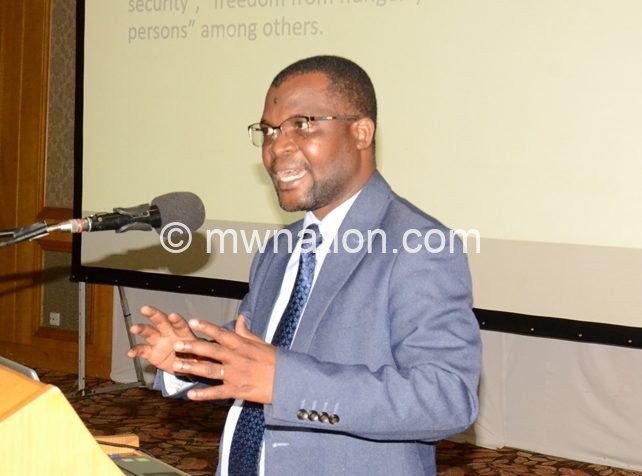Judge dismisses ‘soft’ verdicts, gives 70 years
High Court Judge Redson Kapindu last week taught two men with uncontrolled sexual desires a bitter lesson when he sent them to serve 40 and 30 years imprisonment, respectively after being found guilty of defilement charges.
The two, a 43-year-old Malawian and a Pakistani, had appealed to the High Court their respective earlier sentences meted out by the magistrate’s courts which Kapindu set aside for being “manifestly inadequate.”

The Malawian, Fabiano Maliko, was sentenced to 14 years imprisonment with hard labour by the magistrate’s court contrary to Section 138(1) of the Penal Code after pleading guilty to defiling a 10-year-old girl who used to call him “uncle” because he was her father’s companion and a family friend.
According to court documents, every now and then, the victim’s family entrusted their friend with the task of dropping the little girl or picking her up from school and evidence showed, on some such trips, he used to divert to his house and sexually violate the girl child.
After his sentence, the accused appealed to the High Court, arguing the sentence was “manifestly excessive” and, on his lawyer’s advice, was of the view that under the circumstance a sentence in the region of six years imprisonment would be appropriate.
The Pakistan citizen, identified as Zeeshan Jaral Raja, was convicted and sentenced to 16 years IHL in February 2017 for defilement and nine years for child trafficking contrary to Section 79(1) of the Childcare Protection and Justice Act by the Zomba Chief Resident Magistrate Court. In total, he was given 25 years.
Raja pleaded not guilty to the charges, but was convicted and sentenced upon a full trial.
Dissatisfied with both the convictions and the sentences meted out, he also decided to appeal pursuant to the procedure under Part XIII of the Criminal Procedure and Evidence Code (CP & EC) (Cap. 8:01).
The Pakistan was accused of defiling a 15-year-old Standard Six girl who had travelled from her home in Ntaja, Machinga to see her grandparents in Zomba, but before that was temporarily employed in the convict’s shop to raise money for transport.
In his judgement for the Pakistani, Kapindu argued that with the plurality of aggravating factors in the case, the sentence of 16 years for the offence of defilement was on the lower side.
The judge said: “After considering all the circumstances of the case, the court is of the view that an enhanced sentence of 30 years imprisonment with hard labour is more appropriate, and I so order.
“Similarly, the sentence of nine years for the offence of child trafficking, made worse by the fact that this was trafficking for purposes of committing another very serious felony, that of defilement, was much on the lower side…
“It is appropriate that meaningful sentences be imposed. The court forms the view that a sentence of 20 years IHL is more appropriate,” ordered Kapindu.
The Pakistani’s sentences will run concurrently meaning he will serve for 30 years.
However, that was not all, because as a consequential order pursuant to the convictions imposed and sentences meted out, he ordered the Asian to be deported to his home country immediately upon concluding serving his sentences.
The judge further requested Malawi Prison Service (MPS) authorities to inform the appropriate immigration authorities about the expiry of his sentences at least six months prior to such expiry.
For Maliko’s offences, the judge described them as “very sad, very heart-breaking and grisly” because they shock the society to the core and make people cringe.
“The court cannot imagine the excruciating, piercing pain experienced by the little child. The experience must have been so sordid for her. It is a heartrending thought to consider her dreadful torment and ordeal.
“The court cannot imagine the state of confusion both current and future on the little child… the degree of psychological trauma or injury both present and future on this little child. Offences such as this one are likely to have lasting devastating effects on the victim child,” reads part of the ruling.
Kapindu said the child, in addition to the pain and confusion arising from the sexual abuse, may have growing feelings of shame as she grows, and she may also become deeply distrustful of others.
He reversed Maliko’s 14 years sentence and replaced it with a sentence of 40 years imprisonment with hard labour.
Further, the judge also directed government through the department of social welfare to follow up with the child and ensure every necessary service and support is rendered to her for her physical and psychological wellbeing and development.
Reacting to the two judgements, gender law activist and children’s rights campaigner Bernadette Malunga said the sentencing would send a clear and strong message to those who sexually abuse children.
She said: “Hopefully this will deter would-be offenders. The judgements also give guidance to lower courts as well as courts of similar jurisdiction on how to conduct sentencing in defilement cases.
“They also highlight the effects that defilement and sexual assaults have on girls and women; the psychological and physical impact of the same.”
Malunga, a law lecturer at Chancellor College—a constituent college of the University of Malawi, said the judgements were a departure from past trends where convicts have been getting sentences as low as three years which did not reflect the seriousness of the offences committed.
Last November, Mzuzu-based High Court Judge Thomson Ligowe set a defilement case record when he sentenced Thomas Chavula, 41, to 58 years imprisonment for defiling three young girls between 2016 and 2019. But the sentences are running concurrently and Chavula will only be behind bars for 24 years.





